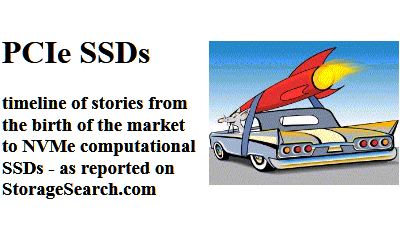|
|
|
|
|
|
SSD news - April 1 - 7, 2012 |
| OCZ launches fastest 2.5"
SATA MLC SSD Editor:- April 4, 2012 - OCZ today launched what the company says - is the industry's fastest IOPS 2.5" SATA SSD family (across a range of apps) - the Vertex 4 (based on OCZ's own regular RAM cache Everest 2 controller) delivers 95K / 85K random IOPS (4K blocks) and 535 MB/s throughput. OCZ's CEO - Ryan Petersen said "The Vertex 4 ... is a milestone product, delivering maximum performance... regardless of data type..." Editor's comments:- it's exactly 12 months since OCZ acquired Indilinx - the company which designed the original Everest SSD controller. Dataram monetizes SSD ASAP IP while retaining XcelaSAN Editor:- April 4, 2012 - Dataram today announced it has sold its patents portfolio related to solid state storage and SSD ASAPs for $5 million to Phan Tia Group. Dataram retains a license to continue to use the patents in current and future Dataram products including XcelaSAN with limited rights to transfer its license. ipCapital Group assisted in patent valuation, and supported Dataram on the negotiation and successful close of this transaction. "This transaction represents an exceptional opportunity to fund new growth initiatives while at the same time it protects our current product portfolio" said John Freeman, Dataram President and CEO. "The license granted to Dataram under this Agreement will also allow us to market, develop and sell XcelaSAN as well as other existing and new Dataram products that incorporate the technology based on these patents. They are all protected under the Patent Purchase Agreement." Editor's comments:- this is a good deal for Dataram. This way they retain their stake in the high availability FC SAN RAM end of the SSD ASAP market - and get some cash to pursue growth ideas. The XcelaSAN has been aimed at niche segments in the enterprise SSD market - but could take off in new directions with the appopriate marketing investment. Dataram probably understands what they have to do to get business there better than anyone else - because they've been working hard to learn what the early adopters in this market want for over 2 years and have been applying that feedback into product tweaks and clearer customer messages. To many readers the sum of money mentioned in this news story sounds small - compared to the tens and hundreds of million dollar sums often bandied about in SSD VC stories. But Dataram is a very conservatively managed company and they get a lot done for what seems to other SSD oems like loose change. SCSI for PCIe SSDs Editor:- April 3, 2012 - The SCSI Trade Association today announced that it has accepted SCSI Express as a formal project and has taken ownership of refining, defining and marketing this data storage industry standard initiative. SCSI Express is an industry initiative designed to adapt storage to PCIe. It uses the SCSI over PCIe (SOP) and PCIe architecture queuing interface (PQI) model being defined within the T10 Technical Committee. Editor's comments:- the PCIe SSD market is already an estalished and permanent part of the enterprise SSD future landscape. What SCSI Express will do is provide an easy way to leverage software stacks which have been already developed for SAS SSDs and iSCSI SSDs but taking advantage of the lower latencies and faster throughput of PCIe. It's all about SSD software. The best way to think about "SCSI Express" is "SCSI for PCIe SSDs". It's the first SCSI standard to be driven by the agenda of SSDs rather than hard disks. See also:- What is SCSI?, storage ORGS MOSAID samples high density fast flash modules for SSD makers Editor:- April 3, 2012 - MOSAID Technologies today announced that it is sampling a 16 die NAND flash stack integrated with its HLNAND bridge interface in a single 100-ball BGA measuring 18mm x 14mm - which provides 512GB raw capacity and 667MB/s aggregate simultaneous R/W throughput as a building block for use by SSD oems to build multi-terabyte SSDs with GB/s throughput by adding their own SSD controllers. MOSAID's VP of R&D - Jin-Ki Kim said - "HLNAND's ring architecture allows a virtually unlimited number of NAND die to be connected on a single channel without performance degradation." LSI announces a new technology roadmap for SSD accelerator components Editor:- April 2, 2012 - LSI today announced details of its new Nytro family of SSD technologies - which integrate and join up several previously standalone elements in its product line in a new unified marketing direction. In particular LSI is saying that its legacy MegaRAID controllers and software stack can be used as reliable proven launch pads for its SSD ASAP / acceleration software - which is being integrated in new upcoming generations of PCIe SSD cards (now called Nytro WarpDrives) which use LSI/SandForce controllers. Editor's comments:- in a 2009 storage market forecast I said - "the high end of the RAID controller market is going to disappear" - and I explained why companies in that market - like LSI had to migrate to PCIe SSDs and SSD systems array technology such as SSD ASAPs to satisfy the emerging needs of their oem customers - which in previous decades had been met by RAID adapters and controller chips. What LSI has done in the past few years is acquire or develop individual pieces of the technology puzzle - and selling their storage systems business Engenio 12 months ago so that they didn't compete with their storage oem customers - was just as important as acquiring SandForce. I spoke to LSI about the new Nytro technology last week. From the sales point of view they see this as offering affordable SSD acceleration for the masses. So you're going to see low price point fast-enough SSD ASAPs - rather than the fastest. Other common features in the product line are that the products are bootable, work with legacy SAS software and have minimal load on the server CPU. LSI will also work to get better integration between the functionality of its SSD controllers and the host cards and caching software. That should lead to better latency and reliability in the future. difference between LSI and FIO? What's the single biggest difference you may ask - between LSI and some of the other companies in this part of the PCIe SSD ASAP market? And in particular a company like Fusion-io? The technical ingredients above are very different - and I could summarize that by saying LSI is at heart an SSD hardware company with most of its IP in chips - whereas FIO is at heart an SSD software company which uses chips as deliverables - but nearly all FIO's IP is in software. That's one way of looking at it - but the clearest difference I see between LSI and FIO is where they are in the philosophy of their thinking re the SSD market adoption model. All the Nytro marketing orientation materials I saw still talked a lot about how SSDs would fit into an HDD world. When I questioned that - I got the impression that LSI's corporate marketing hasn't gone much beyond that stage. LSI is still at the "SSDs help HDDs point" whereas FIO and many other SSD makers - and this publication - and many of you too are beyond that and know that the future of all enterprise storage is solid state. The tricky part is navigating safely from here to there. Finally - Nytro sounds like a good name for an SSD brand - but it's not entirely original. A company called Curtis used to sell a 3.5" FC SSD family called Nitro!FC about 10 years ago. See also:- Inanimate Power, Speed and Strength Metaphors in SSD brands Violin secures $50 million in Series D funding Editor:- April 2, 2012 - Violin today announced it has secured $50 million in Series D funding, which the privately owned company says gives it at an extrapolated market value of more than $800 million. As part of that announcement Violin's CEO - Don Basile said - "This is a multi-billion dollar market opportunity and the latest funding enables us to accelerate our aggressive go-to-market strategy and enhance our data management software portfolio to bring the benefits of Violin's technology to customers worldwide." Editor's comments:- Is Violin really worth $800 million? - There's a new article discussing this today on the home page of StorageSearch.com |
| . |
 | ||||||
| ..... | ||||||
| ||||||
| ..... | ||||||
 | ||||||
| ..... | ||||||
| ..... | ||||||
| ||||||
..... | ||||||
 | ||||||
MLC flash in enterprise SSDs what do enterprise SSD users want? High Availability enterprise SSD arrays Yes you can! - swiftly sort Enterprise SSDs the Problem with Write IOPS - in flash SSDs Data Integrity Challenges in flash SSD Design RAM SSDs versus Flash SSDs - which is Best? Can you believe "reliability" in a 2.5" SSD ad? Auto-tuning SSD Accelerated Pools of storage 7 SSD types will satisfy all future enterprise needs Rackmount SSDs - open vs proprietary architectures what do I need to know about any new rackmount SSD? Bottlenecks in the pure SSD datacenter will be much more serious |







